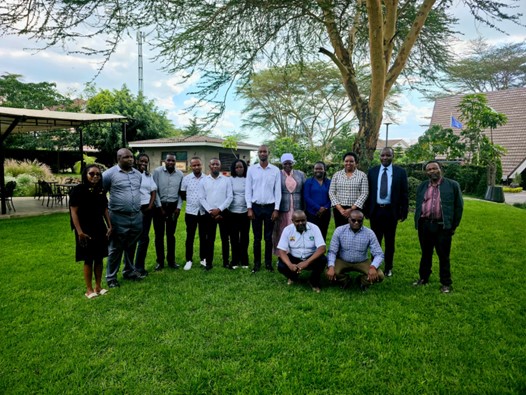October 30, 2025

Kenya is making significant strides in establishing a comprehensive National Pesticide Residue Monitoring Program Framework (NPRMPF), aimed at ensuring the safe use of pesticides in agriculture and guaranteeing that consumers receive produce free from harmful residue levels.
This initiative reflects Kenya’s commitment to safeguarding both public health and the country’s agricultural export reputation through science-based regulation and collaboration.
The development of the NPRMPF is being successfully piloted through a partnership among key stakeholders, including the Pest Control Products Board (PCPB), Kenya Plant Health Inspectorate Service (KEPHIS), the Agriculture Food Authority’s Horticulture Crops Directorate (AFA-HCD), Kenya National Public Health Institute’s Food Safety Division, The Retail Trade Association of Kenya (RETRAK), Fresh Produce Consortium of Kenya (FPCK), Fresh Produce Exporters Association of Kenya (FPEAK), and supported by CABI under its PlantwisePlus global program.
Between May and June 2025, the pilot phase took place in five agriculturally important counties: Kirinyaga, Kiambu, Kajiado, Narok, and Taita Taveta, covering key crops such as tomatoes, kales, and French beans (representative of export produce). Approximately 100 samples were collected and analyzed using standardized protocols to assess pesticide residue levels and inform framework refinements.

PHOTO CREDIT: CABI
PCPB CEO Fredrick Muchiri underscored the framework’s importance, stating that the program will yield vital scientific data to inform regulatory oversight, enhance food safety, and support both domestic and international market compliance. The pilot’s success depended heavily on strong coordination between public agencies, private sector actors, county officials, farmers, and laboratory experts.
With the forthcoming comprehensive report from the pilot, Kenya will be better positioned to implement a risk-based, transparent monitoring system that not only protects consumers but also supports the sustainable growth of the agricultural sector. The NPRMPF aligns with PlantwisePlus’s broader pesticide risk reduction goals, advocating affordable, integrated pest management solutions that minimize risks to human health and the environment.
This initiative represents a major step forward in Kenya’s journey toward ensuring safer fresh produce for consumers at home and abroad while maintaining compliance with stringent global residue standards to enhance competitive market access.
Stakeholders eagerly anticipate continued collaboration and progress as Kenya sets an example in pesticide residue monitoring and sustainable agricultural practices on the continent.
Source: CABI
